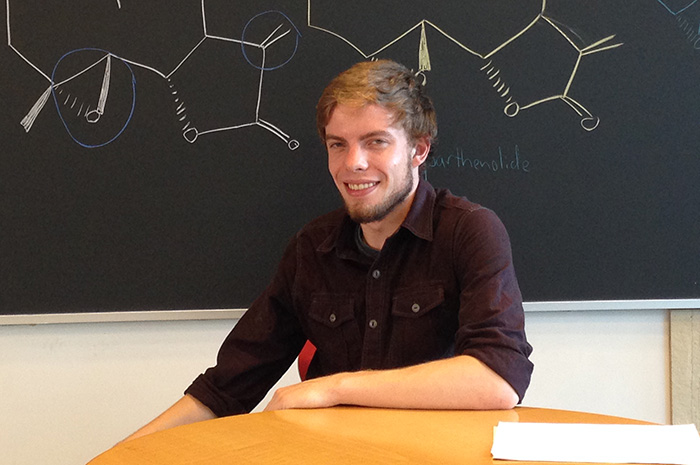The Thrill of Discovery

Andrew McGowan ’16
Treehouse resident Andrew McGowan ’16 is a biochemistry & molecular biology major with a keen interest in sustainability. He’s exploring the field as a student-researcher and ALLARM volunteer. Below, he discusses his little-known talent, the connection between beer-brewing and sustainable living and the whim that led him to Dickinson.
Major:
Biochemistry & molecular biology (philosophy minor).
Clubs and organizations:
Center for Sustainable Living (Treehouse) and peer tutor (organic chemistry).
Honors/scholarships/awards:
Alpha Lambda Delta and Deans List.
Favorite books:
The Unbearable Lightness of Being by Milan Kundera, Walden by Henry David Thoreau and The Plague by Albert Camus.
Favorite movie:
Blade Runner.
On choosing a major:
I initially wanted to double major in environmental science and biochemistry & molecular biology because I’ve been interested in environmental toxicology since high school. However, after taking Professor Susan Feldman’s class on environmental ethics, I decided to minor in philosophy and focus on one major.
Favorite class:
Protein Engineering taught by [Assistant] Professor [of Chemistry] Rebecca Connor. The topics we studied were on the cutting edge of science, combining concepts in genetics, organic chemistry and biochemistry. Professor Connor also pressed us to think like scientists by having us critique primary literature and design our own protein-engineering experiments.
On choosing Dickinson:
I actually came to Dickinson on a whim. My high-school calculus teacher recommended that I apply, and after visiting the campus, I knew that I could thrive at Dickinson.
Favorite place on campus:
By the magnolia tree, behind Dana Hall and the Clarke Forum [office].
Favorite Dining Hall food:
Black bean burger.
Little-known talent:
I play the bagpipes. Before college, I spent much of my time playing with various pipe-and-drum bands. I have played in parades, at weddings and funerals, and in piper competitions.
If I could have dinner with anyone, living or dead, it would be …
… Joseph Campbell. I am one of those college students who is infatuated with his ideas about the significance of myths and symbols in communicating the collective human experience.
About my internships:
For the last five semesters, I worked as a lab technician at the Alliance for Aquatic Resource Monitoring (ALLARM). My main responsibility was to ensure that volunteer stream monitors across Pennsylvania were taking accurate measurements of water-quality indicators in their respective waterways. It was very humbling to listen to their firsthand stories about what it is like to live with shale gas extraction. Because of these experiences, I have become a more confident science communicator, a strong proponent of citizen science and a better listener (I think).
About my research:
For the past year, I have been working on Professor Rebecca Connor’s stress-response project. We are investigating the effects of parthenolide (a compound found in feverfew daises) on the heat-shock response in leukemia cells. The heat-shock response is a type of cellular protector that turns on in the presence of various environmental stressors (temperature, infection, fat, alcohol, etc.), which can cause damage to cells. We know that parthenolide selectively kills leukemia cells and activates the heat-shock response, but we do not fully understand how. I have been investigating exactly how parthenolide activates the heat-shock response using techniques from molecular biology and proteomics.
Through this project I learned …
… that science can be messy and experiments will fail, but it’s all worth it when you discover something new.
Post-Dickinson plans:
I plan to pursue a Ph.D. in biomolecular engineering with a focus on green chemistry and microbial engineering. I want to help make everyday materials (dyes, plastics, fuels, medicines, etc.) from plants instead of petroleum, using microbes as molecular factories. The process is similar to making beer and relies less on the toxic solvents and metals commonly used in material synthesis.
Learn more
- “On Watch”
- “Stressed Out?”
- “Getting Pennsylvania Back On Track”
- Department of Biochemistry & Molecular Biology
- Sustainability at Dickinson
- More Student Snapshots
- Sustainability News
- Latest News
Published September 10, 2015